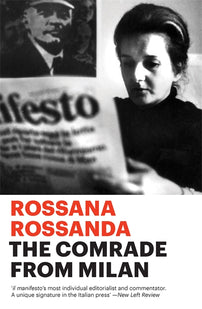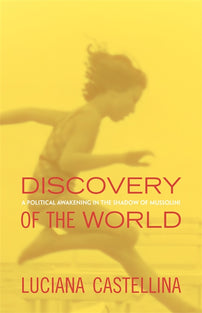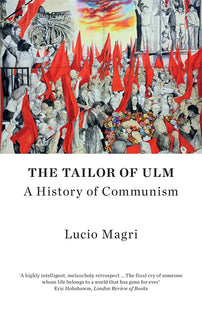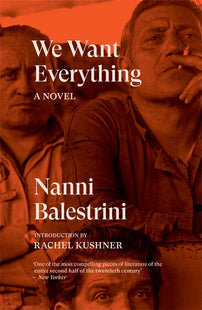Who I Was in 1968 and Other Confessions: an interview with Rossana Rossanda
The legendary figure of the Italian left discusses her new book, her coming to feminism, and her memories of 1968.

First published in Il Venerdì di Repubblica. Translated by Bethan Bowett.
An intimate and surprising confession. Coming out from Rossana Rossanda's Parisian home — great glass windows facing onto the lush internal courtyard of a beautiful Seine-side town-house — one wonders whether these great maternal figures will still exist in fifty years’ time. Women who never cease in their capacity to catch you unprepared, to push you that little bit further, even when speaking on intimate topics concerning femininity, sex, love, the desirability of women, or the mystery of the body and of death. Sitting on her hated wheelchair, left invisible by the flow of words, Rossanda goes straight to the heart of these problems. Her beautiful face, marked by that strange birthmark (“I've always hated it, like the cursed mark from Hawthorne's short story”), the long slender hands that are her only concession to vanity (“they were really beautiful, yes, with an almost secret beauty, you know it is there but it is doesn’t jump right out at you”). As happens in the life of many women, she owes much to her meeting with a friend who was in many respects light-years away from her: Lea Milandri, doyenne of feminist thought. “We had our spats but it was Lea who helped me to discover female specificity.”
At the distance of several decades, the book This Body That Inhabits Me (Bollati Boringhieri) reproduces the rich exchange between Rossanda and Milandri in the journal Lapis. And what better occasion to mark an important anniversary — 50 years since that “most delightful” and “decisive” of revolts, a revolt which continues to have an impact even on those who were not born at the time. As Rossanda explains, “'68 changed the sense of our relations, giving everyone a voice." This was true at school and university, in the press and the workplace, and most of all in the family. In her words: “even though the movement was not able to maintain itself, it was a watershed moment.” And this was also true of the relations between men and women.
In your autobiography you defined '68 as “a historical caesura,” are you still convinced by this description?
No, that was overstated. I agree with Mario Tronti when he says that '68 was a great destabilizing force, but not a constituent one. It dismantled many things but it did not build something positive.
In the sense that little has remained?
I would say nothing has, actually. This growing tide engulfed us and changed us. '68 is the story of adolescents who were old enough to be able to break with a system of authority, in academia and at home. The ‘68ers said no to their professors and so, too, to their mothers and fathers. But for us to be able to speak of a “conquest” there would have to have been some new construction, and I don't see that. The reflux that followed came very quickly.
According to a certain historical reconstruction, the “everything, now!” spirit of those years contains the root of the consumerist individualism of the following decades.
Yes, the individualist component is undeniable. When the fundamental rules of behaviour are broken, one turns inward to the Self. This also marked the difference from the communists, who did not concern themselves at all with considerations of the Self. Though they still asked it for heroic gestures.
So it represented something new even for a communist like you?
No. The culture I came from was that of the European crisis of consciousness. As an adolescent I read Dostoyevsky and Ibsen.
You have previously told the story of the long journey you made to Paris in an old Alfa Romeo Giulia with Lucio Magri and Filippo Maone. Your destination was May '68.
Yes. Actually, we arrived some days late, and we missed the most intense days. The first evening we spent at the Odéon, where we were really stirred by the fact that everyone and anyone could have their say, even people who had never spoken in public before and who were speaking for the first time about themselves to the world. Everything seemed to be within arm’s reach, or rather to have been won already. '68 changed the sense of our relations.
There was no longer a hierarchy?
Even the most dispossessed was loved by all. I don't know if people spoke as much even during the French Revolution, I imagine not. And then all this was lost. The voice of the humiliated and insulted is never heard today.
Perhaps because it is drowned out by continuous chatter?
Even if that is so, it is still true that it has lost its import. I would like to dispel certain myths. We have the habit of recounting the history of the student revolt in terms of its relation to the workers' struggles of '69. But it was not like that. The young people were rejecting authority, but the "hot autumn" was a completely different story. The fact that there was such a prevalent lack of interest towards what was happening in Eastern Europe is also connected to this.
Speaking of giving speeches, you have confessed to being afraid of speaking in those assemblies with the students.
Yes, I have always been afraid of this. I was afraid of not being able to express myself. However, when things get going I don't hold back.
Was it then that relations between men and women started to change?
Something began to shift. Although at our meetings at il manifesto the men invariably had a woman clasped to their legs. There was still a long way to go: we needed to wait for the feminist movement of the following decade.
You were accused by feminists of having entirely sacrificed yourself to male domination. You were like something of an alien species.
I would put it differently: they considered me to be a man. I was a woman who moved on a purely masculine terrain. And I fought against what I thought was unjust without ever considering men to be the enemy. For me politics meant other people, it meant something as natural as breathing, far from a deprivation! I saw the whole world as mine. And so I did not consider my belonging to the female sex a priority concern.
You have said that the discovery of your womanhood came late.
I was already fifty years old. For me like many other women it was the end point of a journey. I owe a lot to meeting Lea [Melandri], because before that I considered myself as essentially a person, that is, a basically neutral being. After meeting her I began to ask myself questions about female specificity.
And you began to reveal the most intimate parts of yourself, like your love life.
In no other relation are we as aware of the other as in a romantic relationship. For this reason, this relationship is not an easy one. In love, I have never sought to merge with the other person; their heartbeat and the words that we exchange have always filled me with tenderness. It is precisely because we remain separate individuals that being in a couple entails an almost impossible challenge. You must love each other a great deal if you are to afford the other that space that is so different to you, which is not only difficult to understand but which seems to protest against you, delegitimising your loving gaze. I thought this then and I still do now.
Is this how your relationship with K.S. Karol was, your companion in life and in struggle for some fifty years?
Yes of course. There were many things which joined us together, starting with our political commitment. But Karol represented the masculine, a completely different world to the one that we shared.
A world that you were familiar with, though.
I have had some extraordinary friendships with men, but since I was a girl I have experienced that same condition that all us women have, of never being primary, only secondary. The ideal is to have an intelligent and kind man above us, whom we trust. I have always been second to a man.
Are you sure?
At il manifesto I was always second to a man. In the political group, I was second to Lucio Magri. In the editorial group, I was second to Luigi Pintor. I was not an easy second to work with as I made life difficult for the both of them. With Lucio, I even went over the top. And it is for this reason that I did not want to leave him alone when he went to Switzerland to die. It is not easy to take the decision to die, believe me. It was horrible. Lucio was very close to me when he swallowed the poison. We had spent the last five days together; you cannot imagine how many things pass through the mind of someone who has taken that decision. A whole world passes through their mind. I would never do that again.
You have always been the older sister.
That is true, yes. I have always been the one in whom you can confide your stories of heartache. I have always been the friend, never the woman you fall in love with.
Did this upset you? Would you have liked to have expressed your femininity more?
Not at all. Things were perfectly fine the way they were. In truth, I don't even know what femininity is. I have certainly not spent my life breaking hearts. And I felt that other women did not even truly consider me to be a woman, simply because I did not give in to their feline guile and their seductive rituals.
You have never tried to seduce someone?
The act of seduction is something shameful.
Why?
I see something deceitful in it, it is a kind of opaque power over the other. Sinister, I would say.
But when you met Karol you must have shown yourself to be interested in some way.
This is not seduction, though. What I was referring to above is that female trait which tends towards subjugating a man regardless of any real interest in him.
In your exchange with Lea Melandri you broke quite a taboo. You said that a woman is primarily looked at. A mirror always accompanies her. And this gaze, directed at her body, is male.
Yes, I am afraid that it is still the case today. And it is very difficult to be free of. A woman is first of all ugly or beautiful, blonde or brunette, legs, breasts and hips. A woman is always subjected to a demand that is never made of men. We are continuously measured and weighed.
Have you also experienced this gaze?
Naturally. And I tried to react in different ways. On the one hand, by dressing myself in the armour of a strong woman, on the other by taking care of my physical appearance. It was a way of making myself feel more protected.
You have confessed that you were never happy with your physical appearance.
The models of beauty that existed at the time we unattainable. I felt inadequate, fat and clumsy. I would have liked to have been more elegant and sportier, like Ava Gardner. I hated the birthmark I have on my face, big, strange and oddly-placed. And my horrible hair, tough and straight instead of wavy and voluminous. This is the reason I do not now criticise women who choose to have plastic surgery. If I had been richer I would have done it myself.
The definition you give of yourself is striking. “People have always seen me as a kind of Winged Victory of Samothrace: striding forward with broken wings and no head. A courageous woman but with a melancholic destiny.”
I did not know I had written that, but it seems fitting. I don't believe, however, that people see me as a being without a head. I would say the opposite.
Do you identify with the description of a melancholic?
Yes, I do have a melancholic temperament, which I inherited from my father. During the 1929 crisis my family lost everything. I remember when they came to our house to take away the carpets and the chairs. My father came out of the experience with a sense of guilt. It is something that weighs on you, a lot.
Would this reflection on yourself and the female condition have been possible without '68?
Maybe not, but I wouldn't want to over-emphasise its importance. Bear in mind that when this revolt took place I was already old. I was 44 years old. And it was a great effort for me to keep up with the students in my heeled pump shoes.
In your exchange with Melandri, you confess to always wanting to know everything, even the date of your death. On the body you write: “the day that it will send word to me saying ‘Listen I'm tired and I've had enough now’, I hope that it will allow me to say ‘OK, I agree, thank you for everything, I've enjoyed myself a great deal.’” Would you say the same thing today?
Yes. Naturally this is a provocation because with my illness, as I have been forced to stay in a wheelchair, there is little to enjoy. But it is a way of telling it “you haven't succeeded with me.” I'm too arrogant to let you win so easily.
[book-strip index="1" style="display"]




